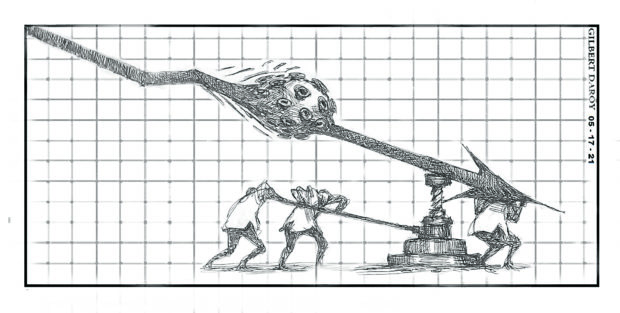Longest recession since Marcos era
The recession that began last year has now extended to five straight quarters after the economy contracted by 4.2 percent in the first three months of 2021 due to the lingering COVID-19 pandemic. This is now the longest recession since the Marcos era, when economic output shrank for nine consecutive quarters due to the Philippines’ foreign debt crisis in the early 1980s.
The risks of a protracted economic downturn are too many, but the most crucial is that it causes millions of job losses that, in turn, plunge more families into poverty. The perils of worsening poverty on the economy and society are far too obvious to everyone—hunger and social unrest topping the list.
Article continues after this advertisementGovernment spending was the only component that posted an annual growth rate of 16.1 percent in the first quarter, much faster than the 5.1 percent and 7 percent expansion in the previous quarter and from a year ago. Investments, on the other hand, continued to shrink by 18.3 percent. Household spending, which accounts for three-fourths of the economy, contracted by 4.8 percent, reflecting the fact that consumers continue to hold back purchases especially of nonessential items. This, in turn, reduces demand for products of manufacturers and service firms alike, forcing them to cut costs by laying off workers. As the ranks of the unemployed swell, so does the number of families being pushed below the poverty line.
While the relaxation of quarantine restrictions in the first quarter enabled millions to regain their jobs and income sources, the outlook for the second quarter is different as the government reverted Metro Manila and nearby provinces to stricter quarantine restrictions. Many private economists are already downscaling their projections due to this development.
The government now needs to implement drastic measures to reverse the economic decline and prevent more vulnerable sectors from falling deeper into poverty. It will be hard to rely on investments from the private sector to generate the much-needed jobs and lift economic activity at this time. Investors will put their money where it will grow, and current economic conditions are not that reassuring.
Article continues after this advertisementFast-tracking many of the Duterte administration’s “Build, build, build” projects, especially those to be located in the regions where COVID-19 cases are manageable, will help create employment for local communities. Construction has a big multiplier effect in terms of generating jobs.
Continuing with the financial assistance to the poor to help them survive with even the most basic of necessities is also of paramount importance. The government may have to borrow or realign some budgeted funds to ensure that the poor will at least have food on their table. Ensuring that local officials down to the barangay level are not stealing the money is crucial for such assistance program to work.
Finally, the government needs to put its nationwide vaccination program in order if economic activities are to return to some form of normalcy. Experts around the world are agreed that achieving herd immunity is key to ending the economic disaster caused by the pandemic. As it is, the vaccination plan seems all too disorganized, with some vaccines now at risk of expiration due to distribution issues and local government officials complaining of the slow pace of vaccine dispersion. There are excess jabs in some cities and shortages in others, vaccine hesitancy remains high among the populace without the corresponding massive information drive from state agencies to address such concerns, and the mega vaccination complex being spearheaded by the private sector has run into opposition from various quarters due to perceived railroading and inadequate explanations by administration proponents. The government and the private sector need to coordinate all their efforts into implementing a cohesive mass vaccination program, especially with the expected arrival of millions of vaccines starting this month.
The country’s economic managers have made the assurance that while the past seven weeks of enhanced community quarantine and modified ECQ in Metro Manila and surrounding provinces posed downside risk to growth in the second quarter, “our actions in the next eight months can reverse these initial losses.” The optimism is welcome, but the bleak record of the past quarters more than makes clear the long, hard road of recovery up ahead.
For more news about the novel coronavirus click here.
What you need to know about Coronavirus.
For more information on COVID-19, call the DOH Hotline: (02) 86517800 local 1149/1150.
The Inquirer Foundation supports our healthcare frontliners and is still accepting cash donations to be deposited at Banco de Oro (BDO) current account #007960018860 or donate through PayMaya using this link.

















